Post-Punk, Politics and Pleasure – seminar, April 5th
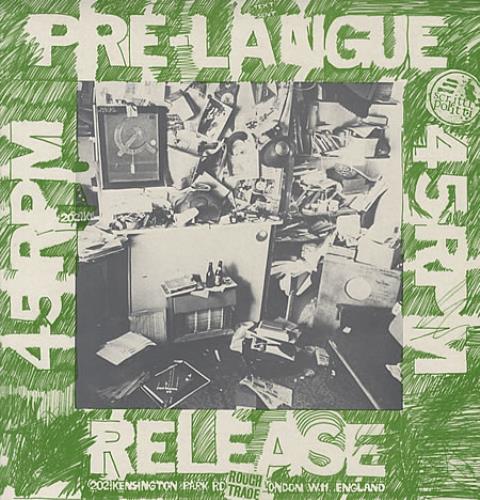
Wednesday 5th April, 5.00 – 6.30 pm
Room 206, University of Westminster, 32-38 Wells Street, London W1T 3UW
Post-Punk, Politics and Pleasure
David Wilkinson (Manchester Metropolitan University)
As the Sex Pistols were breaking up, Britain was entering a new era. Punk’s filth and fury had burned brightly and briefly; soon a new underground offered a more sustained and constructive challenge. David Wilkinson’s new book Post-Punk, Politics and Pleasure in Britain situates post-punk in its historical and political context, showing how residual flickers of utopianism illuminated the movement’s monochrome gloom. The book also locates post-punk in the crossfire of a key ideological struggle of the era: a battle over pleasure and freedom between emerging Thatcherism and libertarian, feminist and countercultural movements dating back to the post-war New Left. Tracing these tensions through a series of case studies on bands such as Scritti Politti, The Fall and the Slits, the book concludes by examining how the struggles of post-punk resonate down to the present.
The seminar will be followed by our last visit of the semester to the Green Man pub … All welcome!
Language and the Problem of Female Authority, Deborah Cameron, Friday 28 April
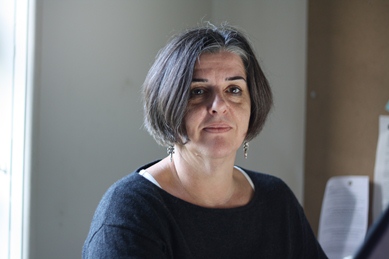
Friday 28th April 2017, 5.30 pm
Fyvie Hall, University of Westminster, 32-38 Wells Street, London W1T 3UW
Language and the Problem of Female Authority
Professor Deborah Cameron (Worcester College, Oxford)
The inaugural public lecture hosted by the Westminster Forum for Language and Linguistics.
Professor Cameron is Professor of Language and Communication and a Fellow of Worcester College at Oxford University. Her research interests are Language, gender and sexuality; language attitudes/ideologies and ‘verbal hygiene’; discourse analysis; language and globalization. She is also actively involved in communicating with a wider audience about language and linguistic research. Parts of her book The Myth of Mars and Venus were serialized in The Guardian newspaper and she has contributed to numerous BBC radio programmes, including Woman’s Hour, Word of Mouth, Thinking Allowed and Fry’s English Delight.
Reserve your free ticket here: https://www.eventbrite.co.uk/e/language-and-the-problem-of-female-authority-tickets-33205721206
Technostalgia Launch at Carroll / Fletcher, March 23rd

March 23rd 2017, 6.30 – 8.00 pm
Carroll / Fletcher, 56-57 Eastcastle Street, London W1W 8EQ
Technostalgia Launch Event, with Alison Craighead in Conversation
To mark the opening of the Moving Museum’s new platform of web-based anthologies, Alison Craighead of Thomson & Craighead and the IMCC will be in discussion with Professor Beryl Graham, Professor of New Media Art at University of Sunderland, and co-founder and editor of CRUMB at Carroll / Fletcher in London. Moderated by Carroll / Fletcher Associate Director Coline Milliard.
Technostalgia, the inaugural anthology edited by Coline Milliard, will go live next week and explore the aesthetics of early technologies, their legacy and impact, as well as their fetishization and appropriation in a contemporary artistic context. Participating artists include Cory Arcangel, Constant Dullaart, Rafael Lozano-Hemmer, Peter Luining, Lorna Mills, Paper Rad, Mark Richards, Gustavo Romano, Evan Roth, Paul Slocum, Thomson & Craighead, and Ubermorgen.
The event will be live streamed by this is tomorrow
Please RSVP@themovingmuseum.com
Jackie Chan vs. Walter Benjamin seminar, March 8th 2017
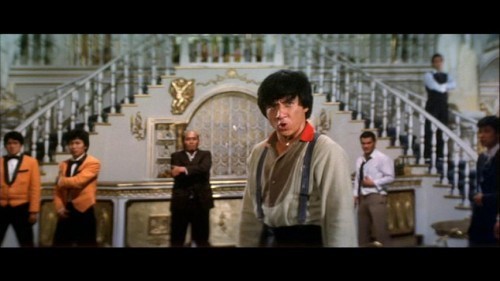
Wednesday 8th March, 5.00 – 7.00
Room 206, University of Westminster, 32-38 Wells Street, London W1T
Jackie Chan vs. Walter Benjamin: Postcolonial ‘utopias of the body’ in kung fu comedy cinema
Luke White (Middlesex University)
In the late 1970s, Hong Kong martial arts cinema took a turn from the tragic-heroic register to that of comedy, propelling Jackie Chan – the genre’s pioneering and most successful kung fu comedian – to first local and regional, and then global, superstardom. Many critics have read the rise of the kung fu comedy, which coincided with a shift away from the militant nationalist or anti-colonial themes of movies such as Bruce Lee’s Fist of Fury (1972), as turning away from politics, reflecting the waning of the turbulence of the 1960s and the new accommodation to a globalised neoliberal order. The research project from this paper derives, however, explores the performing body as a key site where a continuing politics is played out.
The paper analyses Jackie Chan’s performance style in the film Project A (1983) in relation to Walter Benjamin’s readings of the slapstick violence of Mickey Mouse cartoons and American silent-era performers such as Buster Keaton and Charlie Chaplin. The ‘utopia of the body’ that Benjamin discovered in these both offered a critique of capitalist modernity and also promised to fulfil the emancipatory potential lodged within it. The paper sets out to rethink the relevance of Benjamin’s arguments to the specifically postcolonial situation of Chan’s filmic production in 1980s Hong Kong, and to consider what kind of a response (both accommodated and also subtly subversive) his performances might constitute.
All welcome! Followed by the usual drinks in the Green Man.
Spatial Justice at the Tate
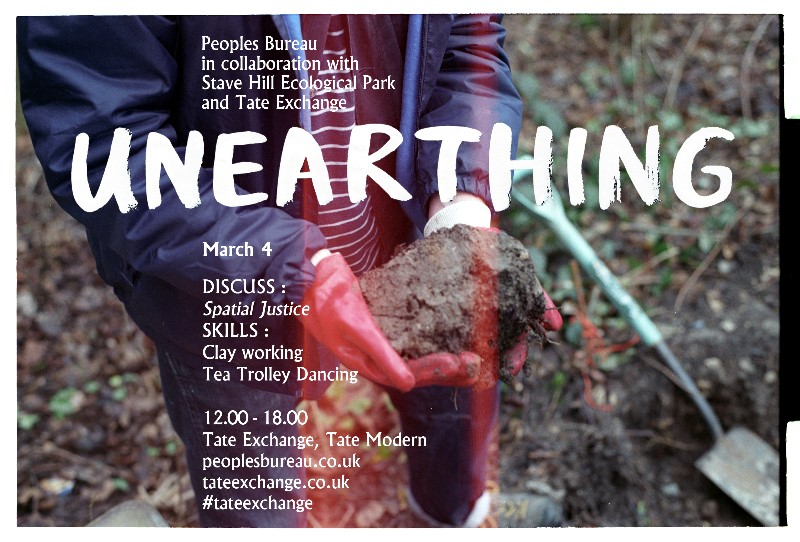
Saturday 4th March, 12.00 – 6.00 pm
Tate Modern, London
Spatial Justice Workshop
Friend of the IMCC, Andreas Philippopoulos-Mihalopoulos, is playing the leading part in a great day’s events at the Tate this Saturday, organised by the Westminster Law & Theory Lab with Tate Exchange and People’s Bureau. Free to all – including tea and cake!
Philippopoulos-Mihalopoulos defines spatial justice as the conflict that emerges when one body wants to move into the space of another body. This opens up questions of symbiosis, creative confluence and regeneration, but also issues of power imbalances. The event hopes to explore ideas about the role of developers, art institutions and artists in dealing with issues of spatial justice and productive ways of reflecting them in their practices. The programme includes a Clay Workshop and Tea Trolley Dances, as well as an interview and discussion with Andreas.
Researching, Writing and Exhibiting Photography Symposium, Saturday 8th April 2017

UPDATE: This event is now FULLY BOOKED. Please complete the form in the link below if you would like to be added to the waiting list. We will be in touch if places become available:
http://rwepsymposium.weebly.com/contact.html
Saturday 8th April, 10.00 am – 6.00 pm
University of Westminster, 115 New Cavendish Street, London W1W 6UW
Researching, Writing and Exhibiting Photography
We’re delighted to announce details of the upcoming Institute of Modern and Contemporary Culture’s one-day symposium on Researching, Writing and Exhibiting Photography.
Speakers: David Bate (University of Westminster); Benedict Burbridge (Sussex); Sara Davidmann (UAL); Anna Dannemann (Photographer’s Gallery); Christopher Morton (Pitt Rivers Museum, Oxford); Russell Roberts (University of South Wales); Karen Shepherdson (Canterbury Christ Church); Kelley Wilder (De Montfort)
This one-day symposium seeks to explore current practices of researching, writing and exhibiting photography, three activities central to the production of knowledge about photography. The symposium will consider the intertwined relationships between these activities from two main standpoints. The first is the ways in which the practices of researching, writing and exhibiting photography draw from, influence and critique one another as they produce our understandings of the photographic. The second is the ways in which the photographic, understood here as technical forms and associated images, operates as a transformative force within society, and in doing so produces the field for researching, writing and exhibiting photography.
Organised into three successive panels – “Researching Photography”, “Writing Photography” and “Exhibiting Photography” – the event brings together researchers, writers and curators working in academic and commercial contexts, and whose interests span from photographic archives to contemporary photographic practice. The symposium will provide a platform to discuss conceptual, theoretical and practical approaches to the study, discourse and display of photography; and how their intertwined relationship(s) can offer reflections on approaching the opportunities and challenges presented by working in the arts and humanities today.
You can find further details of the programme, and can book your free ticket, on the RWEP website here.
Further information from Sara Dominici at: s.dominici1@westminster.ac.uk
The Chinese Experience in London discussion Monday 27 February 2017

Monday 27 February, 1.00 – 2.00
Room UG05, University of Westminster, 309 Regent Street, London W1B 2HW
The Chinese Experience in London
A Conversation with Derek Hird & Anne Witchard
Derek Hird: A Brief History of the Chinese in London, focussing on some of the interesting human stories of the Chinese presence in London over the centuries
Anne Witchard: British literary and cinematic depictions of the Chinese in the early twentieth century, including the silent film ‘Broken Blossoms’ (1919) which is to be shown in the Regent St Cinema on Friday 3rd March.
Book your free ticket for the event here.
Part of the Faculty of Social Sciences and Humanities at the University of Westminster’s week-long Difference Festival.
Lampedusa: Debating the Representation of Migration in an Age of ‘Crisis’
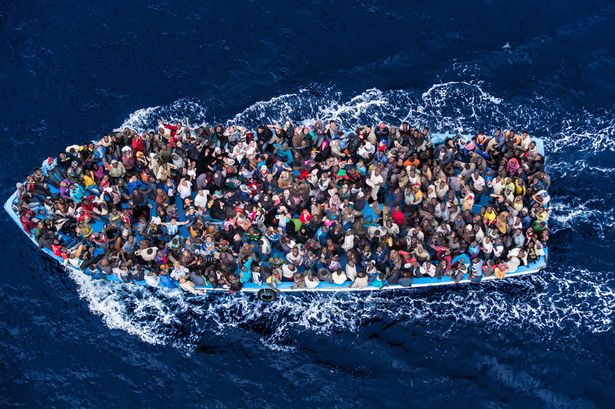
Thursday 2nd March, 6.30 – 8.30
University of Westminster, Portland Hall, 4-12 Little Titchfield Street, London, W1W 7BY
Lampedusa: Debating the Representation of Migration in an Age of ‘Crisis’
Federica Mazzara (Modern Languages and Culture, University of Westminster) – Federica is currently writing a monograph for Peter Lang entitled Re-imagining Lampedusa which explores the geographical, legal, artistic and political framing of asylum seekers and migrants.
Côme Ledésert (film maker/PhD student at University of Westminster) – Côme is the author of Persisting Dreams, a short film about Lampedusa that questions our perception of migrants in Europe.
Maya Ramsay (artist) – An award-winning artist, Maya works with historically and politically important sites including, most recently, the graves of migrants who lost their lives whilst trying to reach Europe by sea.
Lucy Wood (artist) – Lucy set sail from Lampedusa to London in a rescued North African migrant boat on World Refugee Day, 20 June 2013.
Find out more and book a free ticket via Eventbrite.
When Concepts Become Norm: Copyright Law Through Conceptual Art seminar Thurs 23rd
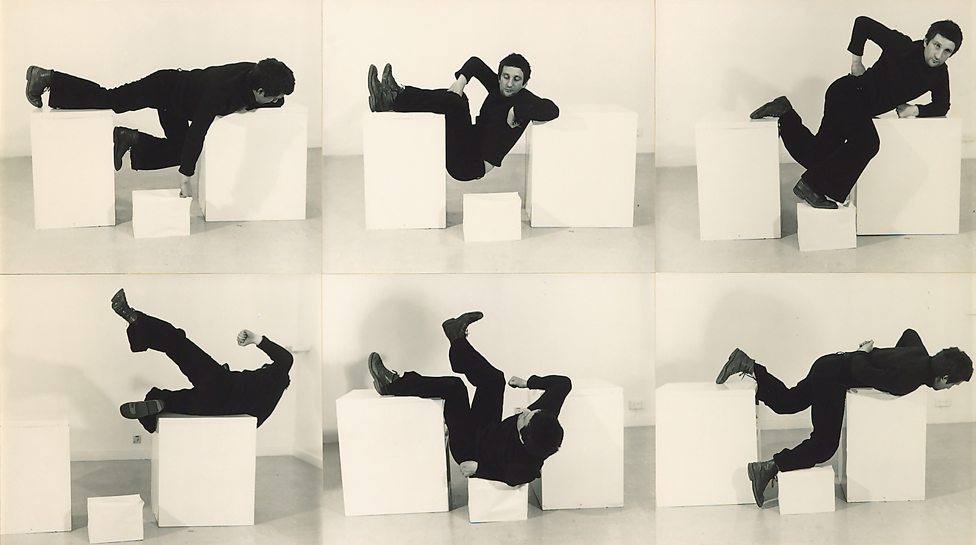
Thursday 23rd February 2017, 5.00 – 6.30 pm
Room 351, University of Westminster, 309 Regent Street, London
“When Concepts Become Norm: Copyright Law Through Conceptual Art”
Danilo Mandic (Law School, University of Westminster)
Respondent: Kaja Marczewska (IMCC)
The fourth of the new series of Faculty of Social Sciences and Humanities Cross-Disciplinary Research Seminars at Westminster is a talk by our good friend Danilo Mandic on copyright and conceptual, with a response from the IMCC’s Kaja Marczewska. One not to miss!
All very welcome. Followed by drinks …
Shadows of the State: Mapping Intelligence Agencies seminar this Wednesday
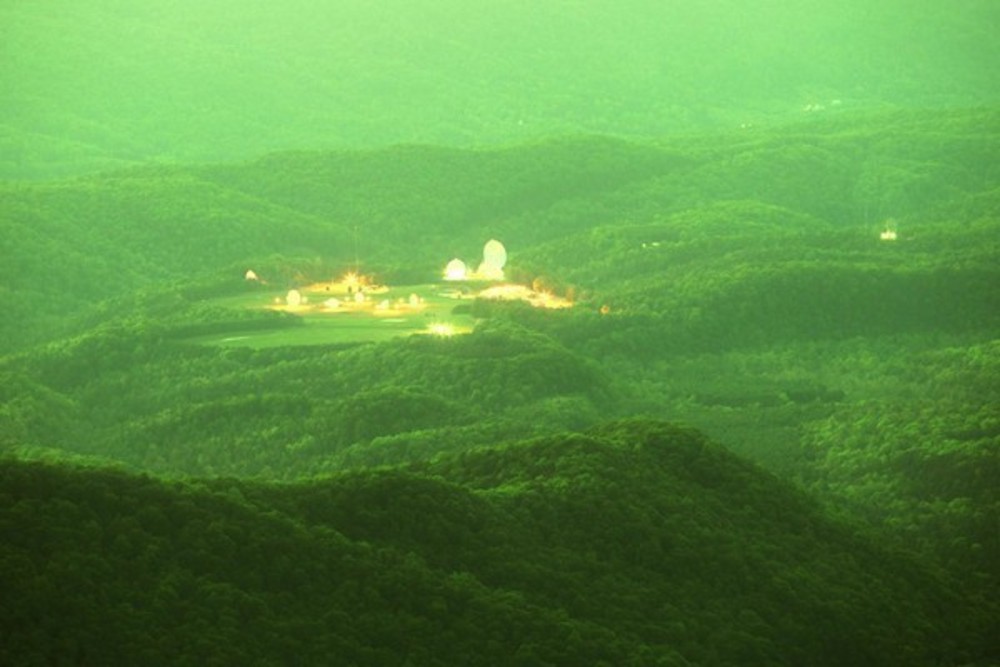
Wednesday 22nd February, 5.00 – 7.00
Room 206, University of Westminster, 32-38 Wells Street, London W1T
“Shadows of the State: Mapping Intelligence Agencies”
Lewis Bush (University of the Arts, London)
Shadows of the State employs methodologies derived from espionage in order to investigate so-called ‘Numbers stations’. These are shortwave radio broadcasts transmitting coded messages and widely speculated that they are the means by which intelligence agencies communicate with their operatives overseas. In this talk I will discuss the origin of these stations, the process of locating them and their continuing role in today’s new Cold War.
Lewis Bush studied history and worked for the United Nations before retraining as a photographer. Since then he has developed a practice exploring the way power operates in the world. Recent works include Shadows of the State, which involved tracking the communications of intelligence agencies. Bush also writes extensively on photography for a variety of titles and maintains the Disphotic blog. He frequently curates exhibitions, and is lecturer in documentary photography courses at London College of Communication and a visitor on a number of other courses.
All welcome! Followed by the usual drinks in The Green Man.
Transparency in International Relations, Law and Politics, Thursday 16 Feb
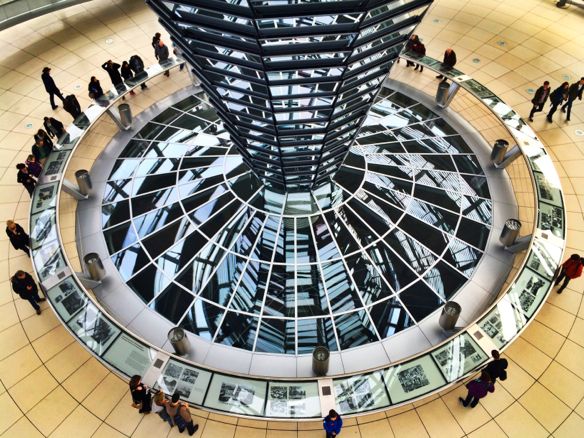
Thursday 16th February 2017, 5.00 – 6.30 pm
Room 351, University of Westminster, 309 Regent Street, London
“Transparency in International Relations, Law and Politics”
Matthew Fluck (Politics & International Relations, University of Westminster)
Respondent: Eleni Frantziou (School of Law, University of Westminster)
The third of the new series of Faculty of Social Sciences and Humanities Cross-Disciplinary Research Seminars at Westminster is a talk by Matt Fluck on transparency, with a response from Eleni Frantziou.
A reminder that the following seminar (with a particular IMCC flavour!) will be same time and place the week after:
February 23rd: Danilo Mandic, “When Concepts Become Norm: Copyright Law Through Conceptual Art”, with respondent Kaja Marczewska
All very welcome! Followed by drinks …
The Difference Festival, February 27th – March 3rd 2017
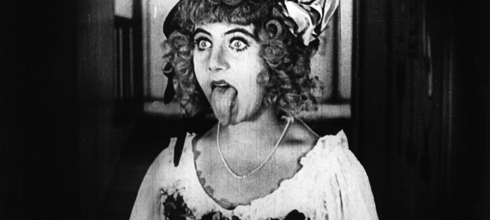
Monday 27th February – Friday 3rd March 2017
University of Westminster, 309 Regent Street, London W1B 2HW
The Difference Festival
The Faculty of Social Sciences and Humanities at the University of Westminster is hosting a week-long (and timely) celebration of Difference from February 27th to March 3rd that will pay homage to the history and roots of the institution, whilst showcasing the work of staff, students, alumni and friends, aspiring to ‘instruct and delight’.
Friends of the IMCC may be particularly interested in some events involving our members and affiliates – including Anne Witchard and Derek Hird discussing The Chinese Experience in London (Monday 27th, 1-2), Gwilym Jones on Shakespeare’s Storms (Tuesday 28th, 1-2) and Federica Mazzara, Côme Ledésert and the artist Maya Ramsay discussing the representation of the so-called ‘migrant crisis’ in the Mediterranean (Thursday 2nd, 6.30-8.30) – but there are a whole interesting events taking place during the week, including a screening on the Friday of the silent film Broken Blossoms (1919) at the Regent Street Cinema, with organ accompaniment.
All welcome! Full details here: https://www.westminster.ac.uk/difference-festival
The Return of the Art and Tech Lab: Transdiciplinary Gravy or Neoliberal Grey Goo?
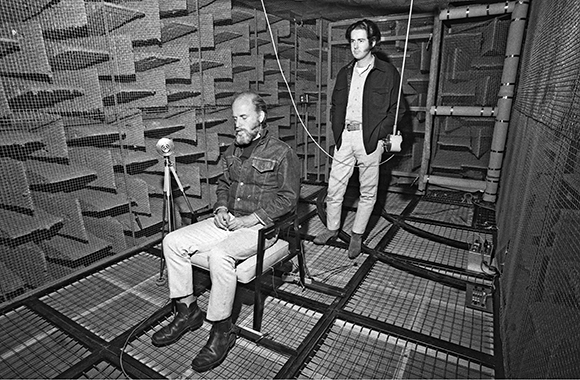
Thursday 2nd February 2017, 5.00 – 6.30 pm
Room 351, University of Westminster, 309 Regent Street, London
The Return of the Art and Tech Lab: Transdiciplinary Gravy or Neoliberal Grey Goo?
John Beck (IMCC)
Kicking off the new series of Faculty of Social Sciences and Humanities Cross-Disciplinary Research Seminars at Westminster is our own John Beck, Director of the Institute for Modern and Contemporary Culture, discussing the perils of transdiscplinarity. With a response from Andreas Philippopoulos-Mihalopoulos.
Future seminars (same place and time) will run weekly as follows:
February 9th: Andrew Linn, “19thC Mass Migration and 21stC Technology”, with respondent Dan Conway
February 16th: Matt Fluck, “Transparency in International Relations, Law and Politics”, with respondent Eleni Frantziou
February 23rd: Danilo Mandic, “When Concepts Become Norm: Copyright Law Through Conceptual Art”, with respondent Kaja Marczewska
March 16th: Ludivine Broch, “The History of Objects in Post-War France”, with respondent Debra Kelly
Thomson & Craighead Love L.A.
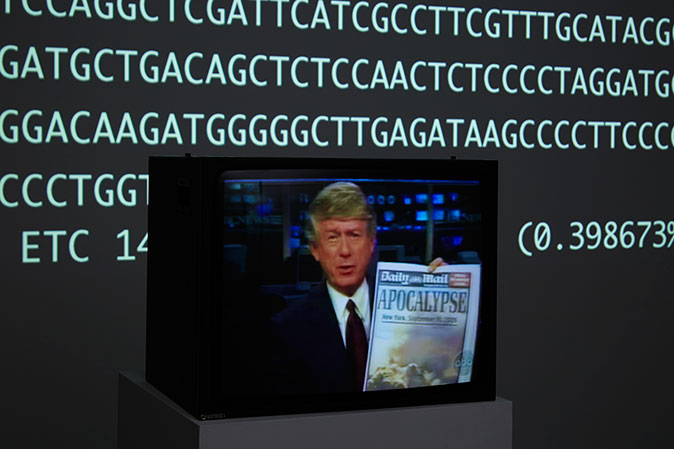
Thomson and Craighead are currently on show at the Young Projects gallery in Los Angeles with the exhibition Wake Me Up When It’s Over. The exhibition will feature nearly a dozen works spanning the years 1996-2016, thereby presenting an in-depth look into the couple’s practice and methodologies.
For the better part of the past two decades Jon Thomson and Alison Craighead have been “digging deep,” as curator Marc Garrett once described their practice, “into the algorithmic phenomena of our networked society; its conditions and protocols (architecture of the Internet) and the non-ending terror of the spectacle as a mediated life.” In the process they’ve employed web cams, data feeds, networks, movies, images, sound and text in their many installations, videos and art-objects–often with a wide array of art-historical reference points, including 1960s systems art, 1970s structuralist film-making, and the compositional experiments of the literature group, Oulipo.
Works featured in the exhibition include: A Short Film about War (2009/2010); Apocalypse (2016); Belief (2012); Common Era (2016); Flipped Clock (2009); Help Yourself (2016); Television Fan (1996); The Time Machine in Alphabetical Order (2010); Trooper (1998); Untitled (Balloon Work) (2016).
More details here.
The French Novel Today with Emmanuel Bouju, Weds 25th January 2017
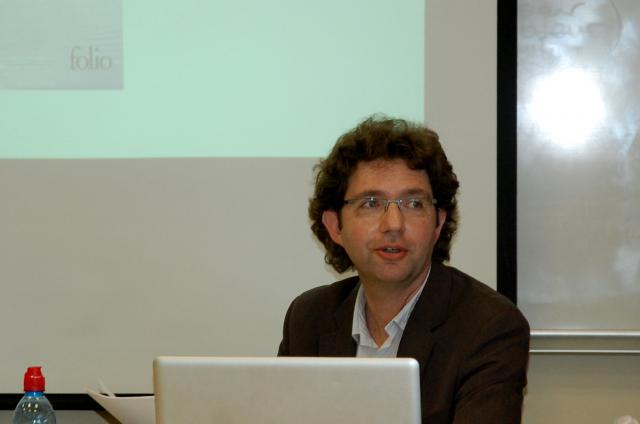
Wednesday 25th January, 5.00 – 7.00
Room 206, University of Westminster, 32-38 Wells Street, London W1T
“Literature on Credit: The French Novel Today”
Emmanuel Bouju (Université de Rennes 2)
For the past twenty years, French literature has lived on credit, or, rather, on the credit of the last century. Placed at the heart of a crisis of trust in public speech, in democracy (which is still undergoing a state of emergency), and in social economics, it now has decreased in fiduciary value. Nevertheless this talk will plead for a new strength and a new authority for the French novel: a strength and an authority that are related to a gradual shift from “the indiciary paradigm” to the “fiduciary paradigm”.
Emmanuel Bouju is currently Professor of Comparative Literature at the Université de Rennes 2 and Senior Member of the Institut Universitaire de France. He has also been a Visiting Professor at Harvard University in 2012, 2014 and 2015. He is the director of the “Groupe phi”, a research group dedicated to historical and comparative poetics. He is also an editor for the Classiques Garnier (Coll. “Littérature, Histoire, Politique”) and for the Presses Universitaires de Rennes. Professor Bouju’s publications include Réinventer la littérature : démocratisation et modèles romanesques dans l’Espagne post-franquiste (with a préface by Jorge Semprún, 2002), La transcription de l’histoire. Essai sur le roman européen de la fin du vingtième siècle (2006) and Fragments d’un discours théorique (2015).
DIY: Start Your Own Journal, Press, or University
Thursday 26 January 2017, 4-6pm
University of Westminster, The Boardroom, 309 Regent Street
DIY: Start Your Own Journal, Press, or University
Workshop led by Professor Craig Saper (University of Maryland Baltimore County)
Looking at a series of experiments in publishing scholarship, this workshop asks participants to propose venues and modes of presentation appropriate to the scholarly questions they seek to ask.
Based on Craig Saper’s research on Intimate Bureaucracies and on his co-founding Electric Press and Textshop Experiments, founding Roving Eye Press, and starting experimental venues for emerging forms of knowledge, like the online reading machine that simulates a modernist project from 1929, as well as participating in others’ experiments in publishing including Punctum Books and the media-making journal HyperRhiz, this workshop asks participants to propose venues and modes of presentation appropriate to the scholarly questions they seek to ask and invites us to consider publishing as scholarship and not merely a conduit for research.
Admission is free, but please register here
UPDATE: CANCELLED: Picturing the Perpetrator seminar, December 7th
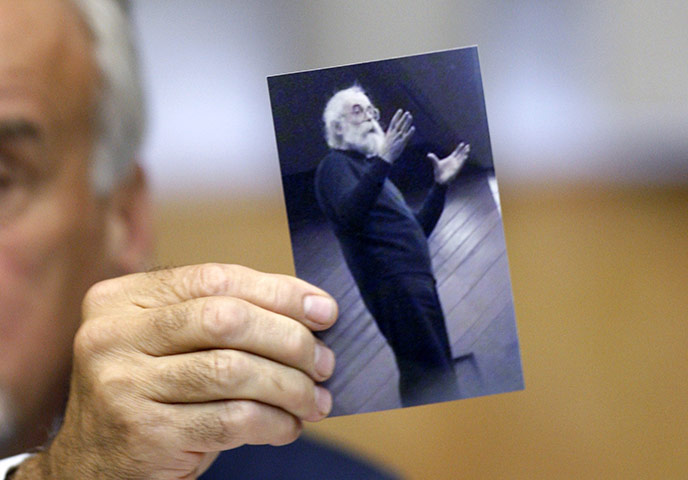
CANCELLED: Unfortunately, due to illness we have had to cancel Paul Lowe’s seminar that was to take place today. We will reschedule in the new year. Apologies.
Wednesday 7th December, 5.00 – 7.00
Room 412, University of Westminster, 309 Regent Street, London W1T
“Picturing the Perpetrator”
Paul Lowe (UAL)
Photographs of and by the perpetrators of atrocities, war crimes and genocide pose a series of troubling and difficult questions for practitioners, media outlets, audiences, and critics. Such images often blur the boundaries of photographic representation, generating a form of genre slippage, such as the formal portrait, where an accepted form of representation with an accepted set of responses, is challenged by the knowledge that the subject, with whom the form invites the viewer to empathize with, is know to be a mass murder. Images made by perpetrators of their actions also are complex, should they be viewed as evidence of their atrocity, or does such an act make the viewer complicit in the re-victimization of their subjects? How should self-images of terrorists be understood and analyzed?
This seminar will explore these questions through the detailed close reading and interpretation of a series of perpetrator related images covering a broad historical and geographic sweep, that will include 19th century colonial imagery, the Holocaust, the conflict in the former Yugoslavia, and the War on Terror. A key feature of this exploration will be the imaginative space generated by the still image. This idea of the image creating a performative space into which the viewer is invited to project their imagination makes the act of photographic production and consumption more akin to that of the theatre or even opera; a space in which the everyday is heightened by the emphasis in dramatic moments to create an encounter that amplifies the situation and draws attention to it, and a space where the co-existence of the everyday and the extreme can collide in the encounter of traumatic realism.
All welcome. Followed by Christmas drinks in the Green Man.
Professor Richard Imgham Inaugural Lecture: Language History and Language Acquisition
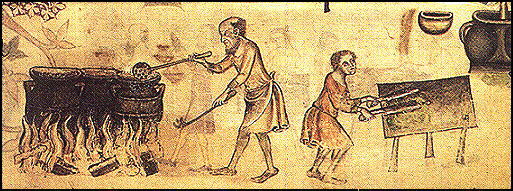
Tuesday 13th December 2016, 4.00 – 6.00 pm
Fyvie Hall, University of Westminster, 309 Regent Street, London W1B 2HT
Language history and language acquisition: making the connection
Professor Richard Ingham, University of Westminster
Please join the Department of English, Linguistics and Cultural Studies for Professor Richard Ingham’s inaugural lecture as Visiting Professor at the University of Westminster. Professor Ingham is Principal Investigator for The Bilingual Thesaurus of Everyday Life in Medieval England, a Leverhulme Trust-funded project based at the University of Westminster and Birmingham City University. In creating an online, freely accessible thesaurus of Middle English and Anglo-French words, the project captures the influence on English of Anglo French at a time of the overlapping presence and use of both languages within England. It allows scholars to conduct research on the Middle English and Anglo-French vocabulary of seven occupational domains: building, domestic activities, farming, food preparation, manufacture, trade, and travel by water.
The lecture will be followed by an introduction to the project by Louise Sylvester, Professor of English Language at Westminster, a brief discussion of the key findings so far by Professor Ingham, a demonstration of the thesaurus by Dr Imogen Marcus, and a drinks reception.
British Story in Spanish
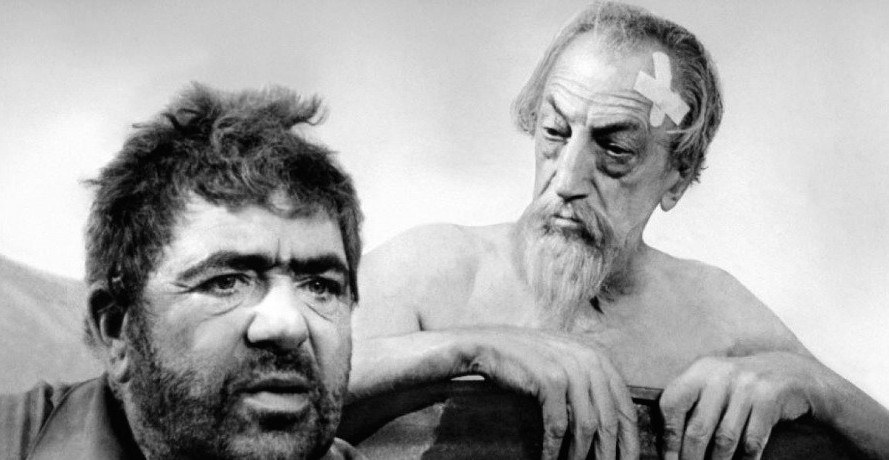
For any Spanish readers, there’s a translation from Michael Nath’s excellent novel British Story to be found in the new issue of the Mexican magazine Argonauta on Shakespeare and Cervantes.
Read it here: https://issuu.com/fomentoculturalirapuato/docs/argonauta-issu_b5fe018e17b451
Call for Papers: Media, Arts and Hybrid Spaces, January 27th 2017
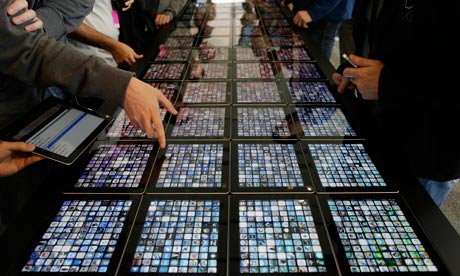
Friday 27th January 2017, 10.00 am – 6.00 pm
Room 315, University of Westminster, 309 Regent Street, London W1B 2HT
Media, Arts and Hybrid Spaces: Experience and Meaning in the Contact Zone
Study Day organised by Centre for Research and Education in Arts and Media (CREAM) in collaboration with HOMELandS
Mary Louise Pratt introduced the concept of ‘the contact zone’ in 1991, using this term ‘to refer to social spaces where cultures, meet, clash and grapple with each other, often in contexts of highly asymmetrical relations of power, such as colonialism, slavery, or their aftermaths as they are lived out in many parts of the world today’. She goes on to introduce the concept of ‘transculturation’, which is expanded upon in her later book Imperial Eyes: Travel Writing and Transculturation (1992), which describes ‘processes whereby members of subordinated or marginal groups select and invent from materials transmitted by a dominant or metropolitan culture’.
The ‘contact zone’ is a site of artistic production but it can also be a site of negotiation of meanings, a context of experience. In her paper, Pratt expands on the notion of the contact zone beyond the interpretation of colonial encounters and deals with difference and conflict in the classroom. She writes, ‘All the students in the class had the experience … of having their cultures discussed and objectified in ways that horrified them; all the students experienced face-to-face the ignorance and incomprehension, and occasionally the hostility of others … Along with rage, incomprehension, and pain, there were exhilarating moments of wonder and revelation, mutual understanding, and new wisdom—the joys of the contact zone’. How might we broaden Pratt’s notion of the ‘the contact zone’? What is its significance in the contemporary sphere and how might it be a useful site for further investigation?
Please send abstracts (circa 300 words) for 20 mins papers by 6 January 2017 to both organisers:
Mattia Lento – Lentom@westminster.ac.uk
Margherita Sprio – spriom@westminster.ac.uk



